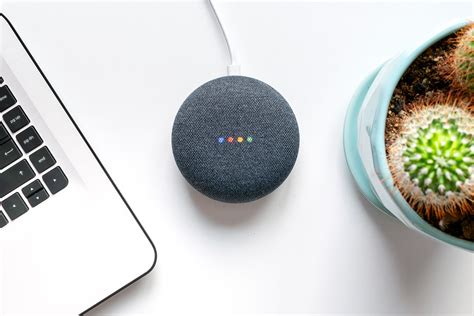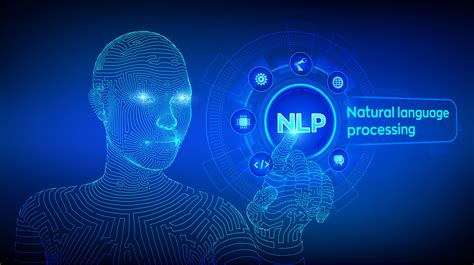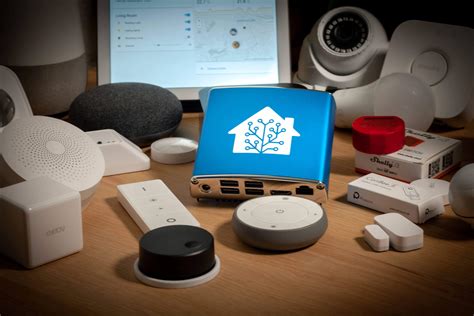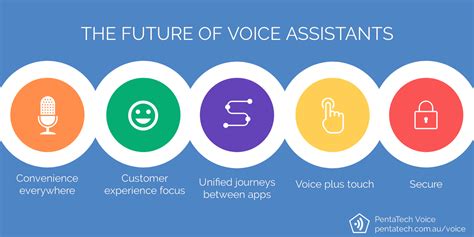Breaking News


Popular News


Learn about the future of voice assistants and NLP, their integration in smart homes, and their impact on business and healthcare industries. Enhance productivity and stay ahead.In today’s digital age, voice assistants and natural language processing (NLP) have become an integral part of our daily lives. From controlling smart home devices to assisting in healthcare and business operations, these technologies have revolutionized the way we interact with and utilize technology. This blog will explore the various facets of voice assistants and NLP, starting with an introduction to voice assistants and an understanding of NLP. We will then delve into the integration of voice assistants in smart homes, their role in enhancing productivity with voice commands, and their impact on the healthcare industry. Additionally, we will discuss the use of voice search and virtual assistants in businesses and explore the potential future developments of these technologies. Join us on this journey to discover the transformative role of voice assistants and NLP in our everyday lives.
Contents

Voice assistants are becoming an increasingly common feature in many households and workplaces. These digital assistants, powered by Natural Language Processing (NLP), are designed to understand and respond to human language. They have the capability to perform a wide range of tasks, from setting reminders and answering questions to controlling smart home devices and conducting internet searches.
One of the most well-known voice assistants is Amazon’s Alexa, which is integrated into the company’s line of Echo smart speakers. Users can interact with Alexa by speaking commands or questions, and the device responds in a conversational manner. Google Assistant, Apple’s Siri, and Microsoft’s Cortana are other popular examples of voice assistants that utilize NLP to provide a seamless user experience.
With the rise of voice-enabled technology, more and more people are adopting these digital assistants into their daily routines. Voice assistants offer convenience, efficiency, and accessibility, making them an integral part of modern life. As the capabilities of NLP continue to advance, the potential applications for voice assistants are only expected to grow.
In conclusion, the introduction of voice assistants has revolutionized the way we interact with technology. Their integration of NLP allows for natural and intuitive communication, enabling users to accomplish tasks with simple voice commands. As we move towards a more connected and automated world, voice assistants are poised to play an increasingly prominent role in shaping the future of everyday life.

Natural Language Processing (NLP) is a field of study that focuses on the interaction between computers and humans using natural language. It is a subfield of artificial intelligence that enables computers to understand, interpret, and generate human language. NLP involves several different tasks, such as speech recognition, natural language understanding, and natural language generation.
One of the primary goals of Natural Language Processing is to enable computers to understand and process human language in a meaningful way. This involves teaching computers to understand the context, intent, and tone of a given text or speech. NLP algorithms are designed to analyze and extract information from large volumes of text data, which can then be used to make decisions, answer questions, or generate responses.
| NLP Applications | Description |
|---|---|
| Speech Recognition | Converts spoken words into text |
| Machine Translation | Translates text from one language to another |
| Sentiment Analysis | Identifies the emotional tone of a text |
| Chatbots | Simulates human conversation through text |

In recent years, the integration of voice assistants in smart homes has become increasingly popular. With the advancements in Artificial Intelligence and Natural Language Processing (NLP), voice assistants such as Amazon Alexa, Google Assistant, and Apple’s Siri have made it possible for homeowners to control various aspects of their home with simple voice commands.
One of the key benefits of integrating voice assistants in smart homes is the convenience it offers to homeowners. By simply speaking commands, individuals can adjust the thermostat, turn on lights, play music, or even lock doors, all without having to physically interact with devices or appliances.
Another advantage of voice assistants in smart homes is the ability to create a connected and seamless living experience. Through the use of smart home devices such as smart thermostats, door locks, and lighting systems, individuals can create a fully automated and interconnected ecosystem within their homes, ultimately enhancing their overall living experience.
Moreover, the integration of voice assistants in smart homes also contributes to the overall energy efficiency of the household. By being able to control and monitor energy usage through voice commands, homeowners can make more informed decisions about their energy consumption, leading to potential cost savings and a reduced environmental impact.

In today’s fast-paced world, finding ways to enhance productivity is a top priority for individuals and businesses alike. One such way to boost productivity is through the use of voice commands. With the integration of voice assistants in various devices and applications, people can perform tasks more efficiently, saving time and energy.
One benefit of using voice commands for productivity is the ability to multitask effortlessly. Instead of typing out an email or text message, individuals can simply dictate their message using their voice, allowing them to continue working on other tasks simultaneously. This not only saves time, but also helps individuals focus on their work without interruptions.
Another way voice commands enhance productivity is through the automation of certain tasks. By simply speaking a command, individuals can set reminders, create to-do lists, or schedule appointments without having to manually input each detail. This streamlines the workflow and reduces the risk of human error, ultimately increasing efficiency.
Furthermore, voice commands can be used to access and control various smart devices in a home or office environment. Whether it’s adjusting the thermostat, dimming the lights, or playing music, voice assistants allow individuals to execute these tasks hands-free, freeing up their time to focus on more important matters.

Voice Assistants in the Healthcare Industry
Voice Assistants in the Healthcare Industry
In recent years, the integration of voice assistants in the healthcare industry has gained significant momentum. These innovative technologies are revolutionizing the way medical professionals interact with electronic health records, schedule appointments, and communicate with patients. Voice assistants have the potential to streamline administrative tasks and improve the overall efficiency of healthcare delivery.
Furthermore, voice commands and virtual assistants can enhance the patient experience by providing personalized support and reminders for medication, appointments, and wellness activities. This not only empowers patients to take control of their health but also reduces the burden on healthcare providers, allowing them to focus on delivering quality care.
Additionally, the use of natural language processing (NLP) in conjunction with voice assistants enables the analysis of unstructured medical data, such as clinical notes and dictations. This has the potential to significantly improve diagnostic accuracy and treatment planning, ultimately leading to better patient outcomes.
With the ongoing advancements in technology and the increasing demand for efficient healthcare services, the role of voice assistants and NLP in the healthcare industry is only expected to grow in the future. These technologies have the potential to transform the way healthcare is delivered and managed, making it more patient-centered, efficient, and effective.

In today’s fast-paced business world, it’s important to stay ahead of the game when it comes to technology. One of the latest and most exciting advancements in this area is the integration of voice search and virtual assistants in the business environment. These tools are revolutionizing the way we interact with technology and are providing a wide range of benefits for businesses of all sizes.
One of the major advantages of using voice search and virtual assistants in a business setting is the potential for increased productivity. With the ability to use voice commands to access information, make appointments, and perform other administrative tasks, employees can save time and focus on more important aspects of their work. This can lead to a more efficient and streamlined workflow, ultimately resulting in better business outcomes.
Additionally, these technologies can also improve the customer experience. By utilizing virtual assistants for customer service inquiries, businesses can provide quicker and more personalized responses to customer queries. This can lead to higher levels of customer satisfaction and loyalty, ultimately benefiting the bottom line.
Furthermore, the integration of voice search and virtual assistants can also improve accessibility for individuals with disabilities. By allowing users to interact with technology through voice commands, businesses can ensure that their products and services are accessible to a wider range of people, creating a more inclusive and diverse business environment.

Voice assistants and Natural Language Processing (NLP) have become an integral part of our everyday lives, and their future potential is limitless. As technology continues to advance, we can expect to see even more sophisticated voice assistants that are capable of understanding and interpreting human speech with greater accuracy and efficiency.
In the future, voice assistants will play a crucial role in various industries, from healthcare to education, and even in our homes. With advancements in NLP, these voice assistants will be able to understand complex commands and carry out tasks with minimal human intervention, making our lives more convenient and efficient.
The integration of voice assistants with smart home devices will continue to grow, allowing us to control our appliances, lighting, security systems, and more through simple voice commands. As NLP technology improves, voice assistants will be able to learn and adapt to our preferences and habits, making them even more intuitive and personalized.
Furthermore, voice assistants and NLP will also transform the way businesses operate, with virtual assistants becoming an essential tool for customer service, data analysis, and overall productivity. As businesses continue to embrace these technologies, we can anticipate a future where voice assistants and NLP play a central role in streamlining processes and driving innovation.

What are voice assistants?
Voice assistants are virtual assistants that use voice recognition technology to respond to user commands and queries. They can perform tasks such as setting reminders, playing music, providing weather updates, and answering questions.
How do voice assistants use natural language processing?
Voice assistants use natural language processing (NLP) to understand and interpret the human language. NLP enables voice assistants to recognize speech patterns, analyze language semantics, and generate appropriate responses.
What are some examples of voice assistants?
Popular voice assistants include Amazon’s Alexa, Apple’s Siri, Google Assistant, and Microsoft’s Cortana. These voice assistants are integrated into smart speakers, smartphones, and other electronic devices.
How do voice assistants benefit everyday life?
Voice assistants offer convenience and efficiency by providing hands-free access to information and services. They can help with tasks such as making calls, sending messages, managing schedules, and controlling smart home devices.
What are the privacy concerns related to voice assistants?
Privacy concerns related to voice assistants include data collection, voice recordings stored in the cloud, and potential breaches of sensitive information. Users should be cautious about the information they share with voice assistants.
How is natural language processing used beyond voice assistants?
Natural language processing is used in various applications beyond voice assistants, including language translation, chatbots, sentiment analysis, and text summarization. NLP technology is also utilized in healthcare, finance, and customer service.
What is the future outlook for voice assistants and natural language processing?
The future of voice assistants and natural language processing is expected to involve advancements in speech recognition, language understanding, and personalized interactions. NLP technology will continue to play a crucial role in transforming human-computer interactions.